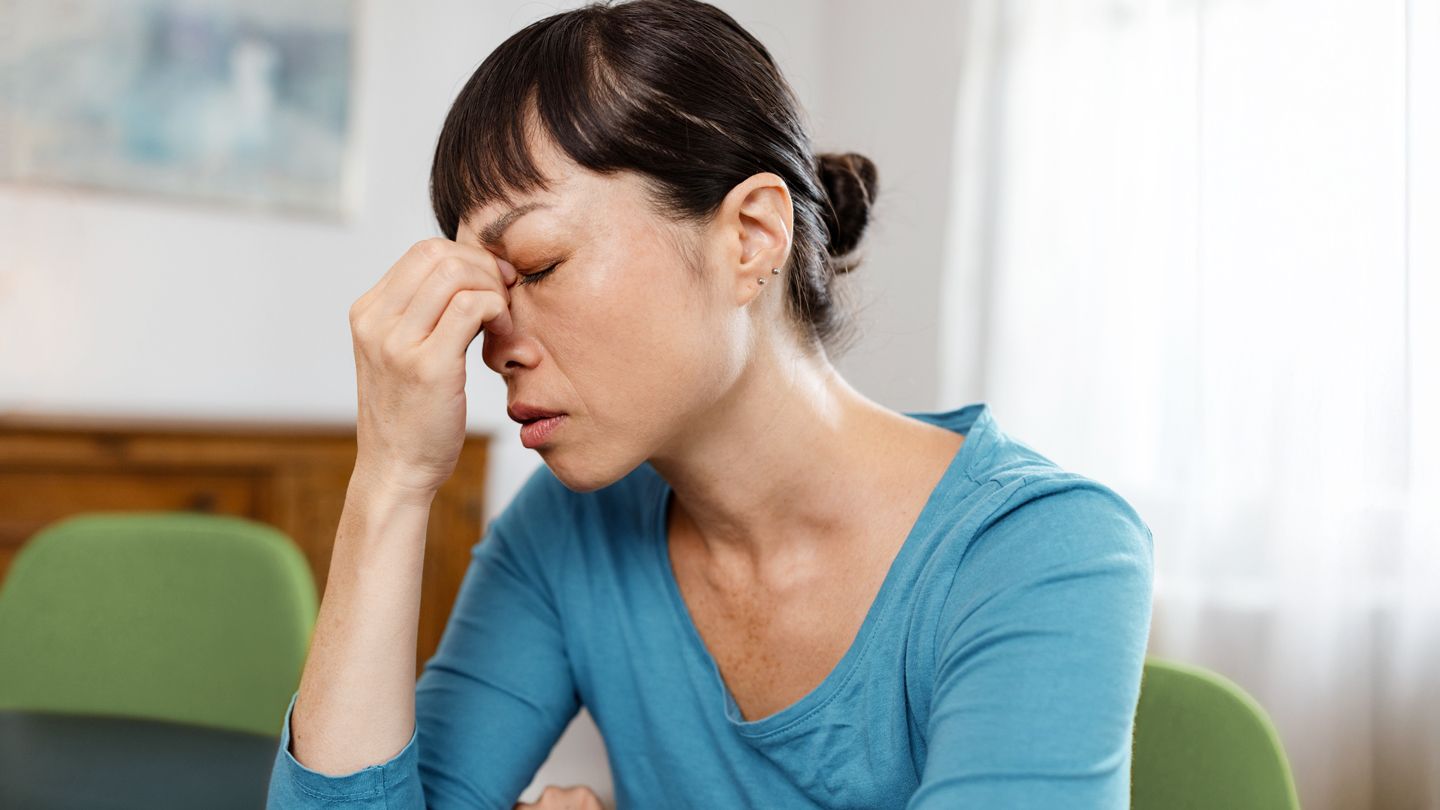If you’re living with the neurological condition migraine , the transition to menopause known as perimenopause could be a rough ride. During perimenopause , which typically begins in your mid-forties and lasts 8 to 10 years, menstruation becomes erratic as the ovaries produce less and less of the hormone estrogen.e60dc2a1-f33c-4a05-9b50-8e3e8e59762959e4c264-f2db-4f0a-a4e6-1123b021d155 Women who have migraine symptoms linked to their menstrual cycle are prone to migraine problems during perimenopause, says Jaideep Kapur, MD , a neurologist and the director of the UVA Brain Institute at UVA Health in Charlottesville, Virginia. But there are ways to stave off or lessen migraine symptoms and attacks even during this time. “I always advocate for patients to take control of their preventive care well before menopause sets in,” says Shivesh Kumar, MD , the founder and chief executive officer of Reliant Physicians in Las Vegas.
The Link Between Perimenopause and Migraine Perimenopause-Migraine Link For many women there is a link between migraine symptoms and attacks and fluctuations in hormone levels, especially estrogen levels, which can go up and down significantly during perimenopause.e60dc2a1-f33c-4a05-9b50-8e3e8e597629bbf177cd-d9e4-427f-9181-3c6581d54bef But while many women with migraine will experience an increase in symptoms during perimenopause, many won’t. “It is very individualistic,” says Vincent T. Martin, MD , the director of the headache and facial pain center at the University of Cincinnati. He explains that for some women, a dip in estrogen levels is a migraine trigger — but for other women, estrogen itself is a trigger, and they feel better with lower levels. After menopause, defined as the time when a woman has gone 12 consecutive months without a period, hormone levels are much more stable.e60dc2a1-f33c-4a05-9b50-8e3e8e59762933183064-164b-490c-a565-bac4bf3547bf For many but not all women this means migraine symptoms cease.e60dc2a1-f33c-4a05-9b50-8e3e8e59762975181087-6734-413b-adc4-3feaa7a21ff6
How Perimenopausal Hormone Fluctuations Lead to Migraine Attacks Hormones and Migraine Raj Singh, MD , an internal medicine provider in the Las Vegas area, says that estrogen fluctuations can trigger the brain’s pain pathways by altering levels of substances called CGRP (calcitonin gene-related peptide). “Women who experience migraine often have higher levels of CGRP in their blood and tears during menstruation compared to women without migraine,” Dr. Singh says. “Estrogen might influence changes through its impact on the body’s natural opioid system,” he adds. “Another hormone, oxytocin — produced in the hypothalamus — may also play a role in migraine attacks that occur when estrogen levels drop.”
Managing Migraine During Perimenopause Lifestyle Changes and Medication Talk to your healthcare practitioner about both nondrug interventions and medications that can help if you’re struggling with migraine symptoms. Lifestyle Strategies Follow these basics of a healthy lifestyle for a more comfortable perimenopause.e60dc2a1-f33c-4a05-9b50-8e3e8e59762955e3cc71-9ec1-46e4-84f8-1ee98ddc63b8 Sleep Make sure you’re getting consistent, high-quality sleep . “Sleep is one of those things where we don’t really get enough of it and sometimes this can result in issues like migraine headaches,” says Kumar. Exercise Take time to exercise regularly . The current recommendation for adults is 150 minutes of moderate-intensity physical activity a week plus two days of muscle-strengthening activity.e60dc2a1-f33c-4a05-9b50-8e3e8e5976290a0af0dc-5eaf-49a6-92d2-b6db8e21f414 Hydration Be sure to drink plenty of water . Experts recommend 4 to 6 cups per day, though some people may need more.e60dc2a1-f33c-4a05-9b50-8e3e8e597629af1717ea-e95f-4a3f-bfaa-8536a5b2d955 Stress Management Work to keep stress levels at a manageable level. Kumar says practices like mindfulness, meditation , and minimizing screen time can all be helpful. Medication Discuss the following migraine treatment options with your medical provider. Triptans Triptans are medications that a person takes when they feel a migraine attack coming on. You may not be able to take triptans if you have certain conditions, such as heart disease, a history of stroke, or uncontrolled high blood pressure, or if you’re taking certain other medications.e60dc2a1-f33c-4a05-9b50-8e3e8e59762991b2793f-271e-4aaf-bf12-e580ea0c735b NSAIDS Nonsteroidal anti-inflammatory drugs such as Aleve can be helpful during migraine attacks. Side effects of NSAIDs include an increased risk of heart attack and stroke.e60dc2a1-f33c-4a05-9b50-8e3e8e5976296e7b1be1-30c5-46a8-ad15-ee45fdbadf53 Hormone Replacement Therapy (HRT) For women who find that low estrogen levels trigger migraine attacks, an estrogen patch can be helpful, Martin says. (He explains that estrogen patches are more effective than estrogen pills at maintaining consistent hormone levels in the bloodstream.) But he warns that for some women whose bodies “like” low estrogen levels, estrogen replacement can trigger rather than alleviate migraine symptoms.
When to See a Doctor When to See a Doctor If you notice that your migraine symptoms are getting worse or are making it difficult to function on a daily basis, seek help from a medical professional. Vision changes should also prompt a healthcare visit.e60dc2a1-f33c-4a05-9b50-8e3e8e597629054f4a7c-ab94-47c8-955c-62c156c6cf69
The Takeaway Many women with migraine find that the hormonal swings of perimenopause make their symptoms worse. Ways to manage migraine and prevent attacks include prioritizing good sleep and practicing stress management techniques. Medications can also help head off or alleviate attacks; discuss options with your healthcare provider.
Resource We Trust Mayo Clinic: Headache and Hormones: What’s the Connection? National Migraine Centre: Migraine, Menopause, and HRT The Migraine Trust: Migraine and Perimenopause Society for Women’s Health Research: Menopause, Perimenopause, and Migraine American Migraine Foundation: Migraine and Menopause
Read the full article here
Leave a comment




